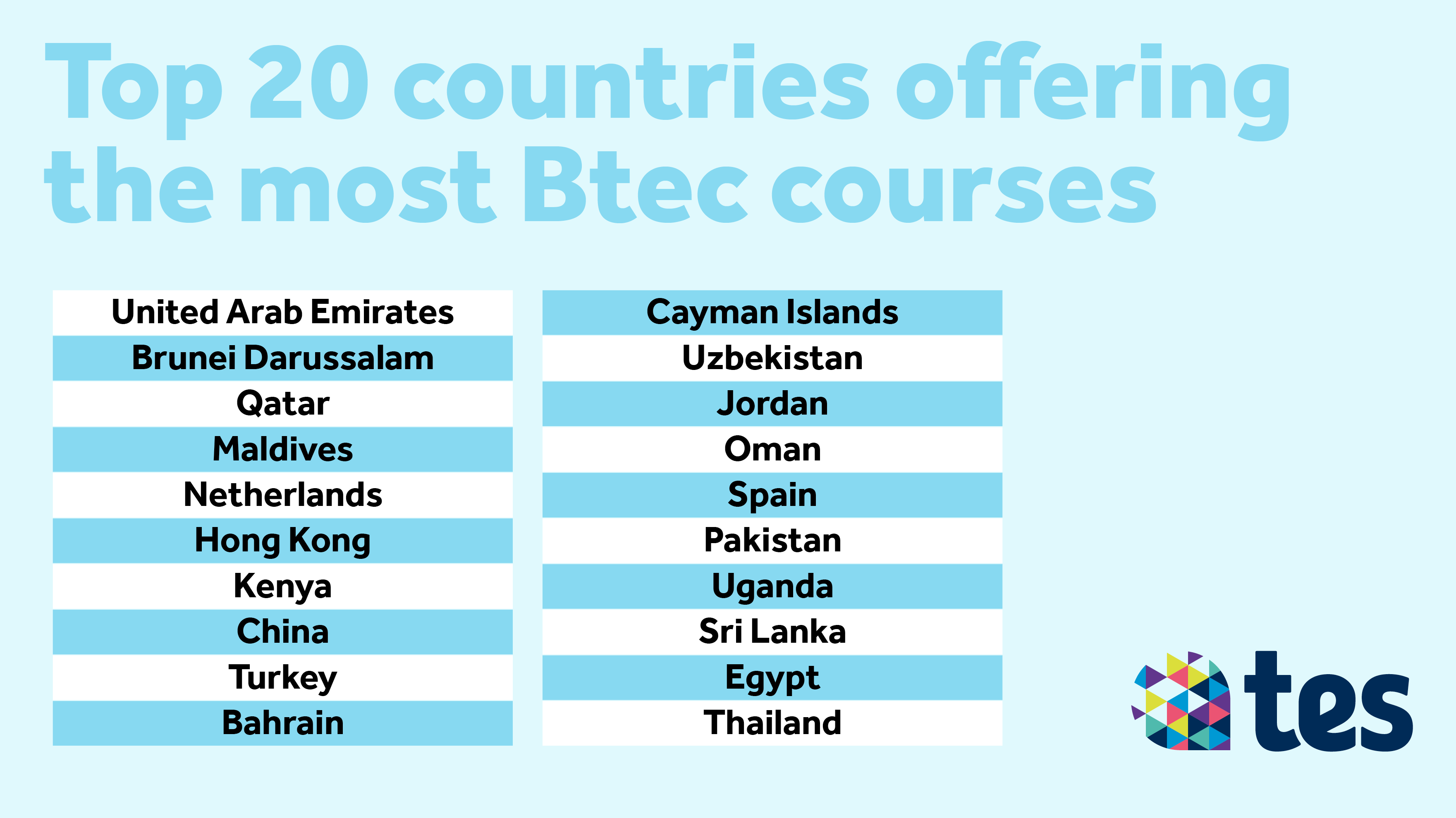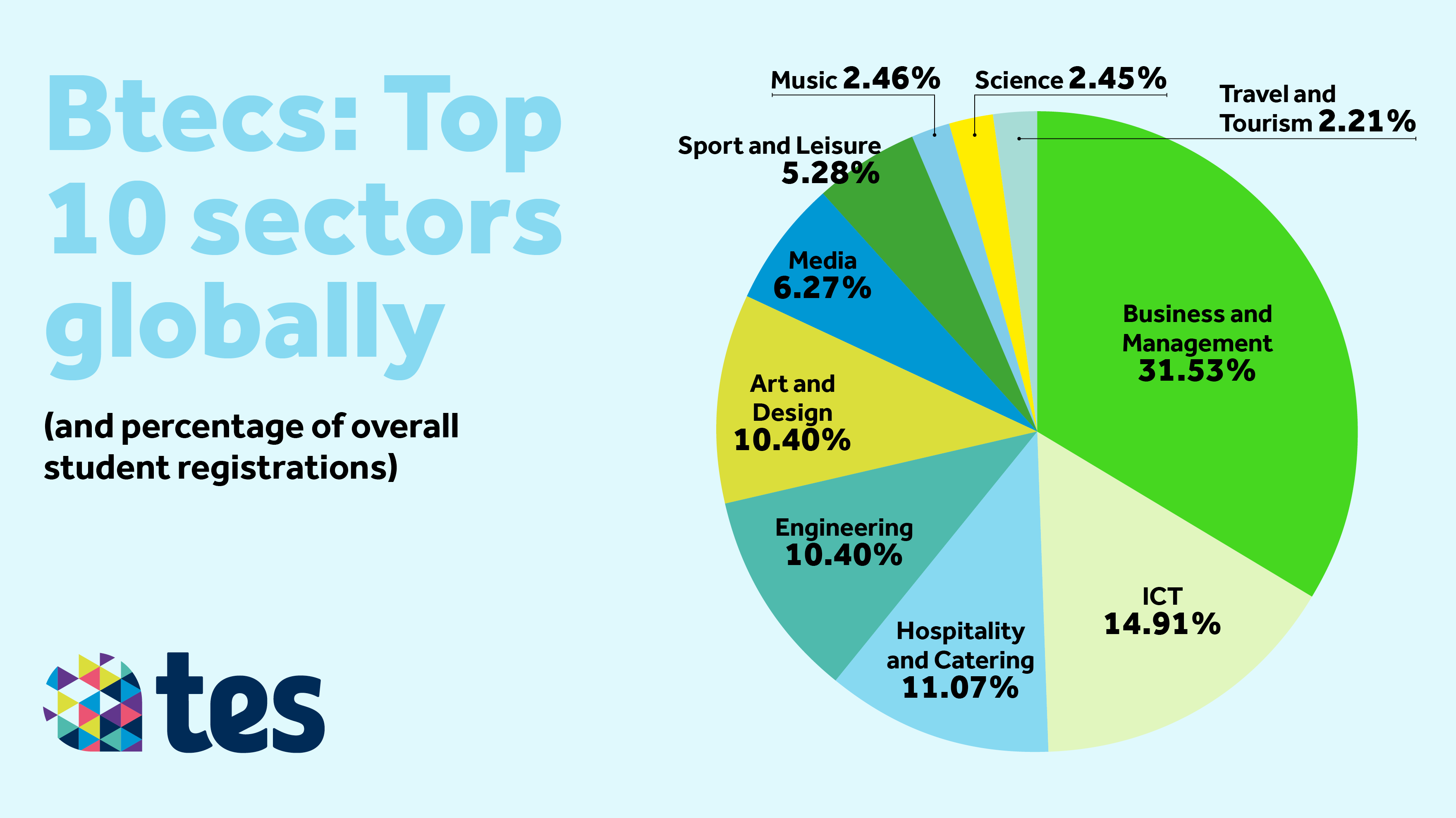
International Btecs: How (and why) they are thriving

In England, Btecs are on unsteady ground. In September the first T levels were introduced as the new “gold-standard” technical level 3 qualification, and while we await the publication of the government’s review into level 3 qualifications - first announced in 2019 - the last cull of qualifications in 2020 resulted in several Btecs being defunded for good.
But while the future of the Btec in England may look uncertain, internationally the qualifications are thriving. Cindy Rampersaud, the senior vice-president for Btecs and apprenticeships at Pearson, says overseas, there has been an increased interest in vocational education, and as a result, demand for the qualification.
“There’s an increased demand for Btec as a qualification and as a learning methodology within many emerging fast-growth markets, and a lot of it is linked to demand for employability and skills and careers,” she says.
“Before Covid, many of these markets had a 5 per cent increase annually in GDP, and they are looking at maintaining and increasing that. Many of them have got very young populations, and they’ve got real shifts in industries. For them, it’s how do you make sure you maintain growth in your economy, you make sure your young people are employed, and the fit is with the right industries.
“There’s a growing recognition for many of these markets that an academic pathway doesn’t support that totally and you need vocational training. It’s about how you develop in partnership with employers, it is about the application of skills, and it is about young people and reskilling adults, too.”
Meet Cindy Rampersaud: Pearson’s Btec champion
More: Why Btecs should not be replaced by T levels
Btecs: Why removing student options would be disastrous
In the past 15 years, Pearson has worked with over 70 countries to develop Btecs in a range of pathways - but it isn’t just about exporting the UK qualification, says Rampersaud, it’s about closing skills gaps, and ensuring local relevance.
Using Btecs to close international skills gaps
“There is still a demand for the UK qualification, but it is very much about doing an assessment to understand the local need, where the gaps are and what the learning is that they need, how we work with local businesses, local governments, local sector bodies, to really ensure that it’s delivered and it’s relevant for those markets,” she says.
“For example, a healthcare assistant in the UK is very different from a healthcare assistant in India, and it’s just understanding and making sure you’re responding to what the right needs are. We have always been in these markets, but what we’re seeing is an increased shift to it being about employment and careers and the importance of continued learning as well.”

In India, the the All India Football Federation has partnered with Pearson and Liverpool Football Club to develop a Btec pathway to plug the gaps in sports careers.
‘You can mould it for the interest of the learner’
Programme lead Shail Kapr says young people in India love the English Premier League, and are more familiar with English football teams than local Indian clubs. At the AIFF, they realised there was a gap in skills provision between the training techniques used by major football clubs like Liverpool FC and those used in the Indian sports world.
And so together, the three developed an international level 3 Btec in sports, covering management, coaching, science and operations. The first cohort of learners began the course in April this year - and Kapr says the benefits are clear to see.
“Currently if you want to be a football coach, you can only be a football coach when you turn 18. That’s when you can get your badging certification. Btec international level 3 starts from 16 - that’s immensely useful for somebody who’s in grade 11 or 12 to try and get a sampling. It gives a fairly clear idea to them: OK, this may be a vocation they may want to pursue,” he says.
“We’ve 39 units of sports, and they are bundled together to create different programmes. The first contact that we have with someone is we try to understand what is her or his interest in joining, so the person says, ‘I see myself as becoming a strength and conditioning coach,’ so you take the units that focus on that profession. If someone else says they want to go into the business side of it, we pull together three other units. That’s the beauty of this programme, then it is so flexible that you can actually mould it for the interest of the learner.”
Currently, the AIFF is delivering the Btec remotely to students right across India, and although Kapr says he can’t see the qualification being delivered through specific schools and colleges, he says he can see how the model would work across other in-need industries in India. Ultimately, the qualification is all about producing students who are industry-ready.
“We are trying to do the job of the industry by giving them ready-to-work learners,” he says.
That goal is shared by the British Esports Association, too. Last year, it launched an esports Btec in the UK - and it is rolling it out internationally, too, in Spain, Dubai, Argentina, Mexico and the Netherlands, to name just a few. In some countries, Btecs are already firmly embedded in the education system - in others, they aren’t. The key to success is locality, says chief executive of ESA, Chester King.
“Obviously, if we just talk about what’s happening in the UK, it’s not really relevant for someone in Mexico or the Philippines. So what we’ve managed to do in our relationship is say to the other countries, ‘Right, give us an example, or can you provide 10 per cent or 20 per cent of content that’s relevant to the audience,’” he says.
“That is what’s so incredibly powerful about esports: there are about 30 different esports globally, but depending on the country, it will depend on the platform, it will depend on the game, so it’s a bit like saying sport, we love cricket, some countries like baseball, but you need to know the resources behind it to implement the understanding. How do you market it? What’s involved? So you need the hook of the localisation.”
King says the qualification fills an international skills gap in esports, and the soft skills needed to thrive in the industry.
“There is a demand because there is so much nuance in esports. For example, if we wanted to put on a tennis tournament, we don’t need anyone’s permission, but if we wanted to put on any commercial esports activity, we’d need a licence from the publisher. Most people won’t even know what that means - there’s a whole lack of understanding so there has to be professional standards being put in place,” he says.
“The global esports federation are trying to instal the standards and they really like what we’re doing, and we’re building a - I’m saying this carefully - a conveyor belt of talent that is going to come through. Last week, the Indians asked us for case studies about jobs once you have these qualifications, because you don’t want to create something that you’re just making money from the qualifications and then actually no one can get jobs.”
And King is clear: the best qualification to give young people an introduction to esports is the Btec, developed by Pearson.
“There are different governments that treat esports very differently. Some call it sports, some call it education, some say it’s to do with health care, and what’s important is that Pearson has the ability to be adaptable,” he says.
“The Btec, as a way of learning, is definitely much more rewarding than the pressure of a single exam. Esports is a continually evolving industry, so you need a continually evolving qualification.”
In Turkey, the Btec isn’t used to fill a specific industry skills gap, but to increase the volume of students taking part in vocational education nationally. Sevinç Atabay is the general manager of the Turkish Education Association and Pearson’s first international Btec ambassador. Five years ago, she recognised the chasm in vocational and technical education in Turkey - and used the Btec to tackle it.
Promoting vocational education in Turkey
“Students asked me, ‘Why should I take the Btec qualification?’ I told them to pursue it, and said the 21st century is a very different century, and one diploma is not enough to help you succeed internationally. All the Turkish students go on to university after high school - but I told them, it’s not enough,” she says.
Originally, two Btec courses were offered in IT and entrepreneurship: today, 16 different courses are available across 40 Turkish schools. Atabay says achieving a Btec has enabled her students to apply to universities around the world.
“Out students are applying to international universities, and are getting scholarships; for example, some are getting scholarships in Italy to study fashion or creativity and design, and it’s because they have got their Btec certificate,” she says.
“Btecs are very updated, and there are courses which I call ‘future work courses’. For this generation, it’s very important for them to get those future skills. The world is changing, and the workplace is changing. But the Btec is constantly updating,” she says.
For Rampersaud, the Btec model is one which, as well as filling those international skills gaps, can make a real difference in the community, too. She highlights the work Pearson does with the girls’ education charity Camfed, whereby it trains women to teach Btecs, which then, in turn, helps to keep them in paid work, and encourages other young girls into education.
“That project really makes a difference, and creates that ripple effect. It’s not just about the export model but understanding the need in different communities - that’s the bit which gives me joy in my heart,” she says. “It’s about responding and driving change, which might be social but also economic and has a big impact over time.”
You need a Tes subscription to read this article
Subscribe now to read this article and get other subscriber-only content:
- Unlimited access to all Tes magazine content
- Exclusive subscriber-only stories
- Award-winning email newsletters
- Unlimited access to all Tes magazine content
- Exclusive subscriber-only stories
- Award-winning email newsletters
You need a subscription to read this article
Subscribe now to read this article and get other subscriber-only content, including:
- Unlimited access to all Tes magazine content
- Exclusive subscriber-only stories
- Award-winning email newsletters
- Unlimited access to all Tes magazine content
- Exclusive subscriber-only stories
- Award-winning email newsletters
